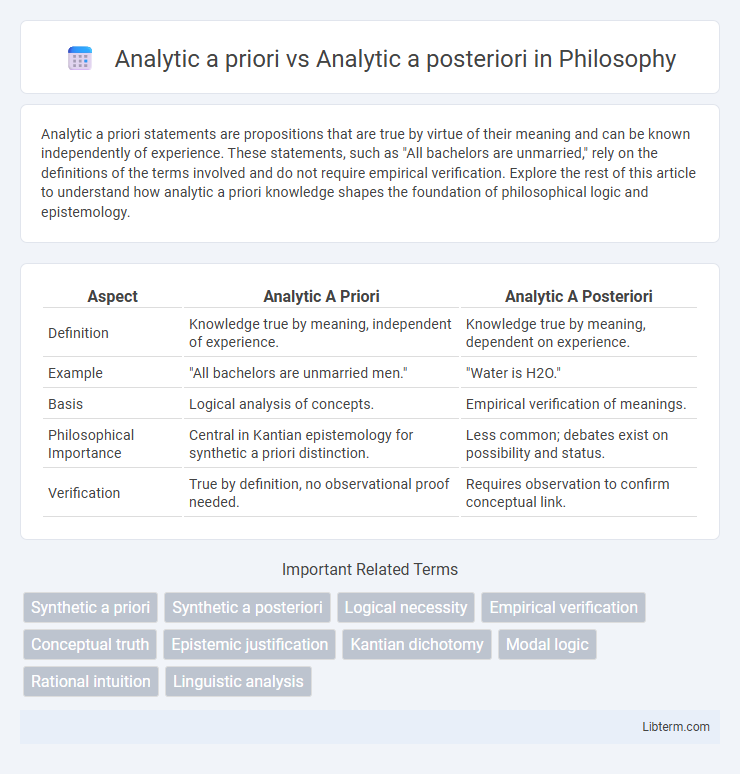Analytic a priori statements are propositions that are true by virtue of their meaning and can be known independently of experience. These statements, such as "All bachelors are unmarried," rely on the definitions of the terms involved and do not require empirical verification. Explore the rest of this article to understand how analytic a priori knowledge shapes the foundation of philosophical logic and epistemology.
Table of Comparison
| Aspect | Analytic A Priori | Analytic A Posteriori |
|---|---|---|
| Definition | Knowledge true by meaning, independent of experience. | Knowledge true by meaning, dependent on experience. |
| Example | "All bachelors are unmarried men." | "Water is H2O." |
| Basis | Logical analysis of concepts. | Empirical verification of meanings. |
| Philosophical Importance | Central in Kantian epistemology for synthetic a priori distinction. | Less common; debates exist on possibility and status. |
| Verification | True by definition, no observational proof needed. | Requires observation to confirm conceptual link. |
Introduction to Analytic Judgments
Analytic a priori judgments are statements whose truth is determined solely by the meanings of the terms involved, independent of empirical experience, such as "All bachelors are unmarried." Analytic a posteriori judgments, though less commonly discussed, refer to statements whose truth relies on conceptual analysis combined with empirical evidence, blending analytic clarity with experiential input. Understanding the distinction between these types of analytic judgments is essential for exploring epistemological foundations and the nature of knowledge acquisition.
Defining Analytic A Priori Statements
Analytic a priori statements are propositions whose truth is determined solely by the meanings of the terms involved, independent of empirical evidence. These statements are necessarily true and can be known through reason alone, such as "All bachelors are unmarried." In contrast, analytic a posteriori statements would require sensory experience, though traditional philosophy holds that analytic truths are exclusively a priori.
Understanding Analytic A Posteriori Statements
Analytic a posteriori statements are propositions whose truth is determined through empirical observation rather than purely by definitions or logic, distinguishing them from analytic a priori statements that are true by virtue of meaning alone. Understanding analytic a posteriori statements involves recognizing that while their predicate concept is contained within the subject concept, their verification requires sensory experience or factual investigation. These statements challenge traditional Kantian categories by blending analytic truth with empirical grounding, highlighting the complexity of semantic and epistemological analysis.
Historical Background: Kant and Analyticity
Immanuel Kant's critical philosophy distinguished analytic a priori judgments as those true by virtue of meanings and independent of experience, contrasting with synthetic judgments that require empirical validation. This framework redefined traditional logic by emphasizing that analytic truths, such as "All bachelors are unmarried," are known through conceptual analysis rather than sensory data. Kant's insights laid the foundation for subsequent debates on analyticity, influencing both analytic philosophy and epistemology in exploring the boundary between knowledge derived from reason and experience.
Key Differences: A Priori vs A Posteriori
Analytic a priori propositions are true by definition and known independently of experience, relying solely on logic or conceptual analysis, such as "All bachelors are unmarried." Analytic a posteriori propositions are less common and involve empirical verification despite their analytic nature, often debated within epistemology. The key difference lies in the source of knowledge: a priori is justified through reasoning alone, while a posteriori depends on empirical evidence or observation.
Examples of Analytic A Priori Judgments
Analytic a priori judgments are statements true by definition, where the predicate concept is contained within the subject concept, such as "All bachelors are unmarried" or "Triangles have three sides." These judgments do not require empirical verification because their truth is grounded in the meanings of the terms involved, exemplified by mathematical truths like "7 + 5 = 12." In contrast, analytic a posteriori judgments are less commonly discussed, as analytic truths are typically considered knowable independently of experience.
Examples of Analytic A Posteriori Judgments
Analytic a posteriori judgments involve knowledge gained through empirical experience while maintaining analytic truth conditions, such as "The current president is a man," where the predicate is contained in the subject but only known via observation. Another example is "Water is H2O," which analytically defines water's chemical composition through scientific investigation. These judgments contrast with purely analytic a priori claims by relying on sensory data to confirm the predicate's application despite its analytic nature.
Philosophical Implications and Debates
Analytic a priori statements are true by definition and their truth can be known independently of experience, highlighting the role of language and logic in knowledge acquisition. Analytic a posteriori concepts challenge this by suggesting empirical data can influence what is considered analytically true, raising debates about the boundaries between analytic and synthetic knowledge. Philosophers like Kant and Quine have extensively debated these distinctions, questioning the categorical separation and its implications for epistemology and the philosophy of language.
Challenges and Criticisms
The distinction between analytic a priori and analytic a posteriori statements faces challenges in clearly demarcating knowledge derived independently of experience versus that requiring empirical validation, leading to debates over their epistemological boundaries. Critics argue that some purported analytic a posteriori claims, such as those involving necessary empirical truths, blur the line once thought rigid, complicating Kantian frameworks. The challenge lies in reconciling semantic analyticity with empirical content without collapsing the differences or dismissing the validity of synthesized knowledge.
Conclusion: Relevance in Contemporary Philosophy
Analytic a priori propositions are true by definition and independent of empirical evidence, while analytic a posteriori claims require experience for validation despite their conceptual nature. Contemporary philosophy often debates their relevance in understanding knowledge boundaries and the justification of beliefs. Recognizing the distinctions sharpens discussions on epistemology, particularly in the analysis of linguistic meaning and the sources of human cognition.
Analytic a priori Infographic

 libterm.com
libterm.com